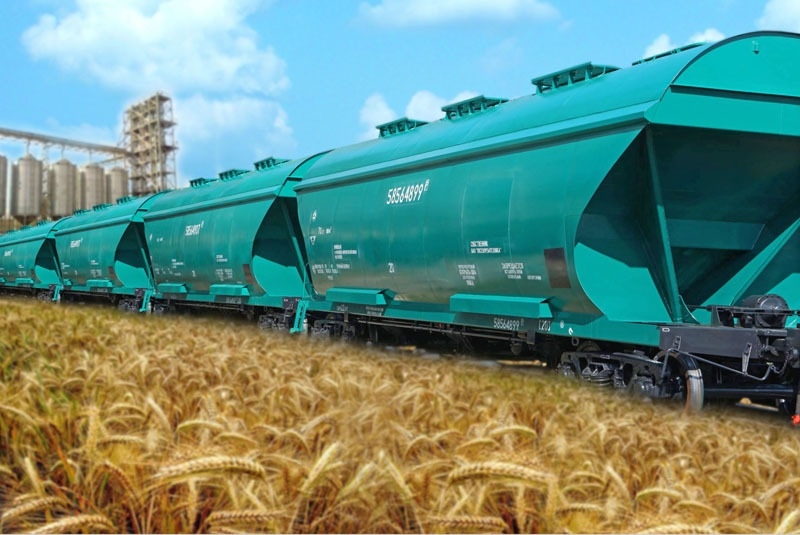Farmers call on Ukrzaliznytsia to reduce transportation tariffs

The confrontation between farmers and the state railway carrier reached a historic peak. In this incredibly difficult season, agricultural producers are facing three crises: two natural ones - war and bad weather, and one artificial one - the inflated cost of rail transportation. This was discussed at the round table "Agrosector + railway: an open dialogue for the sake of joint survival and development", held in Kyiv the other day by representatives of the agricultural sector and experts.
Grain was usually transported by railway to the ports, and with the beginning of the war, the routes were reoriented to the western borders. This caused problems due to the limited capacity of crossing points and the shortage of European wagons. But Ukrzaliznytsia received much more cargo than the crossings could pass, so soon all 18,000 grain wagons stopped in queues, delivery times increased to several months, and due to the shortage of wagons, their prices rose sharply. Railway logistics rose from last year's $20/t to $150-200/t, which is 70% of the grain price.
The cost of logistics consists of the transportation tariff and the cost of wagons. In the summer, at the beginning of the season, the tariff was increased by 70% from $6.5 to $11/t, and prices for the use of wagons rose from UAH 2,000 to UAH 14,600/day, as UZ created an artificial demand for the active disposal of its own fleet, according to farmers. The reason is the lack of a transport planning system coordinated with the schedules of foreign carriers.
After the opening of the grain corridor, most of the grain cargoes were directed towards the ports, which increased the efficiency of the use of wagons, but did not eliminate their shortage. If before the war, the UZ managed the streams with the help of conventions, now there is no control. This means that when cargo is accepted for transportation, their downtime is immediately planned, which causes losses to the owners. The more wagons stand, the more wagon owners earn and farmers lose.
Unfortunately, the agricultural sector was made the main donor of Ukrzaliznytsia, as it is difficult for farmers to organize themselves to protect their interests. And UZ increases its own profitability, causing losses to farmers, which does not befit a state company in a country where there is a war. Railway logistics has put the agricultural sector on the edge of survival, and not everyone will be able to sow in the spring. And those who can will think about what they will do with the future harvest.
In the UZ, the increase in tariffs is explained by the increase in the price of energy carriers and the high demand for wagons, and also advises farmers to review their own business model, since the agricultural sector wants to transport 50 million tons per year, while the capacity of the infrastructure does not exceed 20-30 million tons. Cheap transshipment through ports is already there will not be, and the capacity of western transits is limited, so farmers need to export products with added value - oil, flour, cereals, etc.
This could be taken into account if it were not about the survival of the industry, which is almost the only one that is still working. The world is waiting for our grain and is ready to buy it in pre-war volumes. However, against the background of rising world prices, we limit our own exports and help our competitors earn. In addition to direct losses, farmers also have indirect losses, as they cannot enter into forward contracts due to the difficulty in planning transportation.
According to UCAB estimates, in 2023, the sowing area will decrease by another 20-25%, so if we do not solve the problem, we will lose not only the area, but also the sales markets. And UZ will lose its main customers, so it is strange that it advises farmers to rebuild their business, instead of solving the logistical problem that it itself created.
Agrarians and market experts propose to create a Unified Transportation Planning Center that will coordinate the work of cargo owners, carriers, terminals, and foreign companies. Whereas now the system only plans UZ operations, and all others have to adapt to them. As a result, it will be possible to avoid cargo downtime, reduce transportation costs and increase their efficiency. The introduction of the initiative requires the political will of the government of Ukraine and coordination of issues with neighboring countries.
Currently, farmers are building up their own fleet to reduce dependence on UZ. Therefore, a decrease in the rates for the use of wagons is recorded at UZ auctions. Of the 1,750 wagons put up for sale on December 19, 1,140 or 65% were bought at the price of UAH 3,083.93, and of the 1,750 wagons put up for sale on December 21, 470 or 27% were bought at the price of UAH 2,848.06, while on December 13 and 14 the bid exceeded 4 .3 thousand hryvnias/day.


